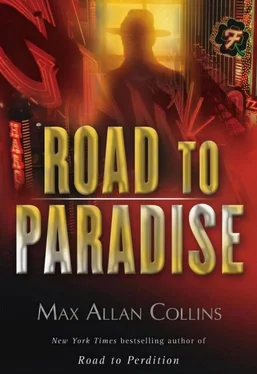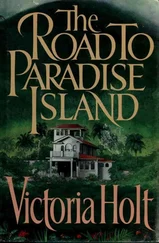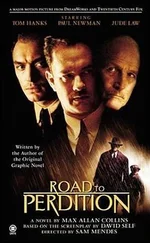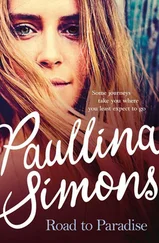“Anna told you not to tell anybody about us — about my being a witness, didn’t she?”
“Y-yes.”
“Well, that includes your parents, Cindy. Do you understand? That includes your parents.”
The girl nodded a bunch of times, then rose to get some Kleenex from a dispenser on the kitchen counter. He rose and went to her, put a hand on her shoulder.
“I’m not mad at you.”
She was still crying, but not hard.
“I know you were just trying to be Anna’s friend.”
“I... I am Anna’s friend.”
“And that’s why you’ll keep everything we talked about between us — just you and me, Cindy.” He took her face in a hand, gently. “Just you and me? Friends?”
She swallowed and nodded. “Friends.”
He was going off to join her parents when her voice called out, “Mr. Smith!... I’m sorry. Didn’t you ever do anything stupid, when you were a kid?”
“No,” he said, and smiled at her.
She laughed a little, choked on snot, blew her nose, and was crying at the glass table again as he stepped into the living room.
Molly, reading House Beautiful magazine, was seated on a squat low-backed red-and-black sofa that was like a massive unhealed wound against the pale-pink walls. A squat ugly cactus decorated an end table, and a pop-art print of a crying comic-book woman was framed on one wall next to shelves of stereo gear and LPs, opposite another wall of silvered panels reflecting the room back at itself, distortedly.
Sid was at the front picture window, the dark-pink drapes drawn, peeking around an edge. “Goddamned hippies,” he was saying.
Michael stood beside him. “Cindy gave me the information I needed. She was very helpful... What’s wrong, Sid?”
He nodded toward the street. “I noticed this pothead scum earlier today, driving around the neighborhood.”
Leaning in next to his neighbor, Michael looked out and saw a van parked just down the block, almost directly under the burned-out streetlamp, straddling where the Smith property ended and their next-door neighbor’s began... an old faded red panel truck with flowers and peace symbols and the KEEP ON TRUCKIN’ guy painted on it, badly.
Sid’s upper teeth were showing, and he wasn’t smiling. “What are they doing, coming around a respectable neighborhood like this for, anyway? Making their goddamn drug deals...”
The back of Michael’s neck was tingling, but he said, “Don’t worry about it,” and patted Parham on the shoulder. “I’ll check it out.”
“Would you, pal? You, uh... want me to go with you?”
Michael smiled and shook his head. “No. I’ll just run over and tell ’em to go peddle their papers someplace else.”
“Rolling papers, you mean!”
He managed a polite laugh, and said, “Why don’t you two check on your daughter? She’s a little upset.”
Parham nodded, and he and Molly went off in their unisex uniforms, toward the kitchen.
Michael turned off the front stoop light before slipping out of the house.
That van had not been here when he’d crossed the street half an hour or so before. Head lowered, he walked down the sidewalk on the Parhams’ side of the block, away from his house. When he came up from behind, along the driver’s side of the battered van, he stayed down, hoping not to be picked up noticeably in the side mirror.
Like a carhop with a gun, Michael thrust the .45 through the window into the chest of the driver and without even getting a good look at the hippie behind the wheel, harshly whispered, “What the hell is this about?”
But the hippie behind the wheel was not a hippie.
He was a hood in his forties from Chicago in a bad Beatle wig and an old paisley shirt and tie-dye jeans and a fur vest Sonny Bono might have considered cool in 1966.
Jimmy Nappi was Giancana’s man, a driver on scores mostly, with tiny eyes, a long nose, a wide mouth, and plenty of pockmarks. He was not known as a tough guy, not somebody generally enlisted for killings, though he was a made man, so had killed at least once.
But if Nappi was here — parked just down the street from the “Smith” house, with his hands on the wheel of a van that tried much too hard to look like it belonged to hippies — it could only be for one reason.
No time for discussion; no reason to give Nappi a chance to go for the .38 on the rider’s seat beside him.
Michael buried the snout of the .45 in the hair vest and fired, and all that Sonny Bono fur served well as an impromptu silencer.
Heading around back of the house, Michael again stayed low, 45 in hand. With the Lincoln in the driveway, they would have figured he’d be home. He prayed he was not too late. He climbed over the fence and lowered himself to the cement patio by the pool. The sliding-glass doors onto the kitchen were locked, he knew, but another conventional door was down off the laundry room, and he used his key on it as silently as possible, easing the door open, making only the slightest creak.
Laundry room was empty.
Kitchen, too — just as he’d left it, right down to the dishes in the sink.
Padding through on his crepe soles, he could faintly hear Ed McMahon saying, “ Heeeeere’s Johnny ,” the audience responding with the usual applause; he’d left the TV on in the rec room, when he left. That might actually help — it would cover him...
In the trashed living room, standing next to the slashed, stuffing-spilling Chesterfield sofa, using a can of red spray paint on the wall, was another Giancana hood playing hippie (in a wig and jeans and Hendrix T-shirt) — Guido Caruso, a big fat-faced fuck who took pleasure in beating on deadbeat welshers, when they were smaller than him, anyway.
Sprayed across one of the abstract green-and-black-and-red-and-white geometric paintings, Guido had written: off the pigs! On the wall over the couch, he had already written heltar [ sic ] and had just gotten to skel when Michael blew the top of his head off and made another abstract painting on the wall, albeit lacking a frame and heavy on the red.
Michael barreled into the hallway and almost ran into the third “hippie,” this one with a fake beard to go with his Beatle wig and faded striped red-and-blue jeans and an American flag T-shirt — Frankie Inoglia, a sadistic enforcer in the Mad Sam mode. As skinny and wild-eyed as Manson himself, Inoglia had just exited the bedroom where Michael had left Pat not long ago.
Inoglia had a blood-dripping butcher knife in his Playtex-gloved fist, and when he saw Michael coming, he raised the blade high, a pearl of blood flicking off the poised-to-stab point onto Michael’s cheek like a single tear as he shot the intruder in the right kneecap, and — as Inoglia was going down — Michael shot him in the left kneecap, too, then kicked the knife out of the fallen, screaming man’s hand as he passed, heading into the bedroom.
Michael would relive this waking nightmare many times, but it would never be as vivid as in this moment.
The nightstand lamp was switched on, its shade spattered and streaked with red. kill the pigs was fingertip-scrawled in blood on the wall just over the headboard of their four-poster, and Pat, on her back, was slashed to ribbons on the bed itself, the sheets soaked, her black silk pajamas shimmering with the life that had been spilled. He stood beside her and looked down and saw that her throat had been cut, slashed ear to ear. The other wounds — save one, over her heart — were not so deep. They were window dressing, part of the hippie masquerade. The chest stab had killed her, and — judging by the placid expression on her lovely untouched face, eyes closed — in her sleep.
This small saving grace would be for Michael the only thing, in days ahead, that would stave off madness.
Читать дальше











